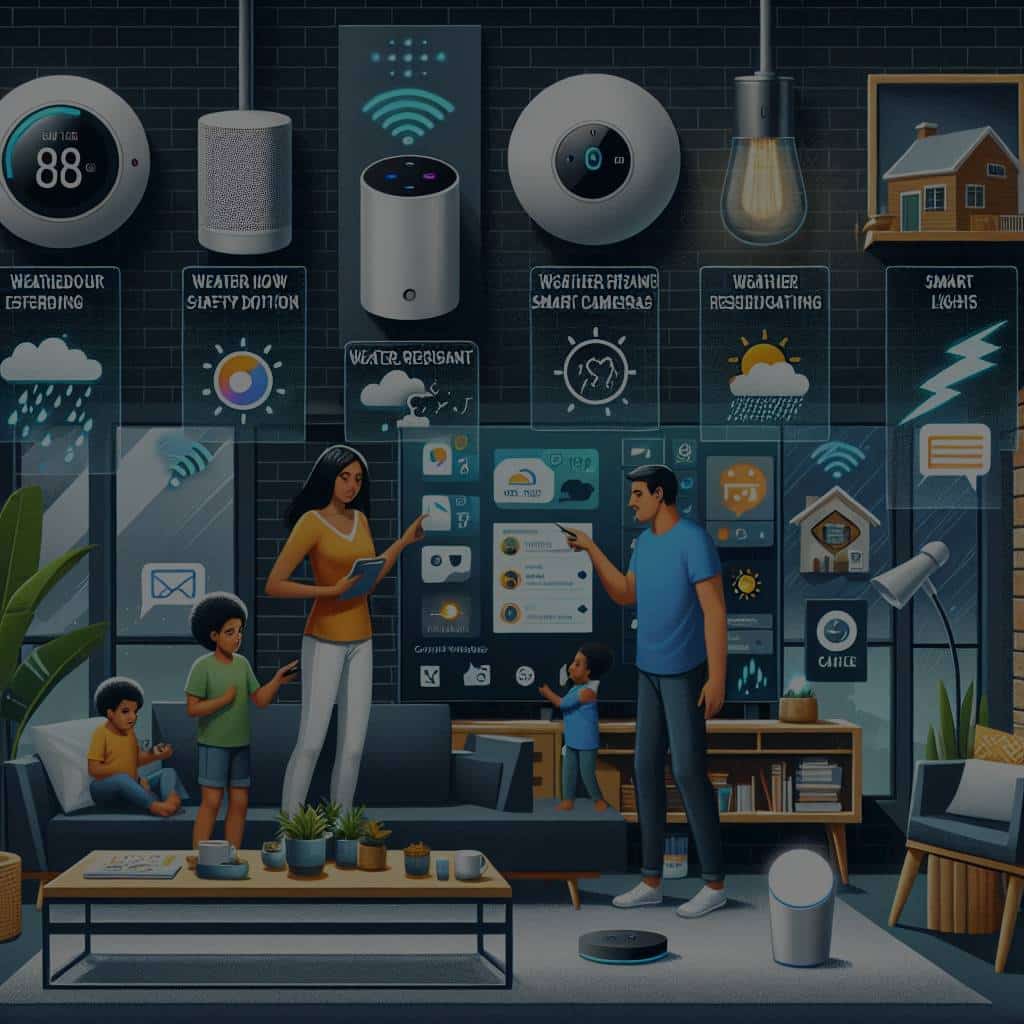How to Prepare for Extreme Weather Events with Smart Home Technologies?

As climate change intensifies, our homes face an ever-growing threat from extreme weather events. Ranging from dangerously high temperatures to powerful storms and floods, these events can cause significant damage to properties, disrupt lives, and even cause fatalities. Fortunately, technology is not standing still. Smart home technologies are now becoming a crucial tool for safeguarding our homes against such scenarios. They offer a new level of resilience, helping us to anticipate, respond to, and mitigate the risks associated with extreme weather.
These technologies use data collected from various devices and sensors around the home to provide real-time alert to potential hazards, allow for swift emergency response, and ensure the continuous supply of basic necessities such as power and water. In this article, we will explore how you can prepare your home for extreme weather conditions using smart home technologies.
A découvrir également : How to Develop a Personal Brand Online for Career Advancement?
Enhancing Home Resilience with Smart Home Technologies
Bracing your home for extreme weather events is no longer just about physical fortifications. It’s also about equipping it with smart technologies that boost its resilience. These systems are designed to adapt and respond to a variety of circumstances, providing you with critical information and automated responses that can prevent damage and save lives.
For example, smart home systems can use data from weather stations, combine it with local reports, and alert you of impending extreme weather conditions. This early warning can give you precious time to secure your property, gather essentials, and even evacuate if necessary.
Cela peut vous intéresser : What Are the Key Developments in Battery Technology for Renewable Energy Storage?
In addition, these systems can also automate critical home functions. For instance, in the event of a power outage, smart home systems can automatically switch to backup energy sources, ensuring that you have continuous power during an emergency.
Water and Power Management in Extreme Weather Events
One of the most significant challenges during extreme weather events is ensuring the continuous supply of water and power. Without these essentials, your home can quickly become uninhabitable. Fortunately, smart home technologies can offer robust solutions to these problems.
Smart water sensors, for instance, can detect excessive moisture levels in your home, which can indicate potential flooding or leakage. When this happens, they can automatically shut off the water supply to prevent further damage. Additionally, these sensors can also monitor water quality, ensuring that your water supply remains safe for consumption during an extreme weather event.
On the other hand, smart power systems can ensure continuous energy supply during a power outage. These systems can automatically switch to a backup power source, such as a generator or solar panels, when they detect a power interruption. They can also manage energy consumption during an emergency, prioritizing essential appliances and shutting off non-essential ones to conserve energy.
Leveraging Data for Proactive Response to Extreme Weather
In preparing for extreme weather events, proactive action is critical. And this is where smart home technology shines. By leveraging data from various sources, it allows you to anticipate potential risks and take necessary precautions before an event occurs.
Smart weather stations, for instance, can provide real-time updates about local weather conditions. These devices use a combination of sensors to measure temperature, humidity, wind speed and direction, rainfall, and air pressure. They then send this data to your smart home system, which can analyze it and alert you to potential risks.
Moreover, smart home systems can use this data to automate various responses. For instance, if the system detects a drop in temperature that could lead to freezing, it can automatically adjust the thermostat to prevent pipes from freezing and bursting.
Emergency Response and Recovery with Smart Home Systems
In the event of extreme weather, a swift and effective emergency response can make a significant difference. Thankfully, smart home systems can facilitate such responses through automation and real-time data.
In cases of flooding, for instance, smart water sensors can automatically shut off your water supply, preventing further water damage. Similarly, in case of a power outage, smart power systems can automatically switch to a backup power source and manage energy consumption.
Moreover, smart home systems can also facilitate recovery after an extreme weather event. For instance, they can help you assess the damage to your home by providing data on areas affected by water or power interruptions. They can also assist in coordinating with insurance companies by providing detailed records of the event, enabling a smoother claims process.
In all, smart home technologies offer a robust solution for preparing your home for extreme weather events. By leveraging data and automation, they can enhance your home’s resilience, ensure continuous supply of water and power, enable proactive responses, and facilitate swift emergency response and recovery.
Applying Home Technology for Real-Time Air Quality Monitoring and Emergency Preparedness
Air quality is a significant aspect of emergency preparedness, particularly in the face of severe weather conditions. Be it dust storms, wildfires, or high humidity levels, extreme weather events can drastically impact the air quality in your home environment, posing potential health risks. This is where smart home technology can play a vital role in real-time air quality monitoring and decision making.
Smart home devices, such as air quality monitors, can continuously track the levels of various pollutants in your home’s air, including dust, smoke, and volatile organic compounds (VOCs). These devices can integrate with your overall smart home system, sending you real-time alerts when the air quality reaches a dangerous level. This gives you the chance to take timely actions, such as activating air purifiers, closing windows, or even evacuating if necessary.
Moreover, these devices can store air quality data over time. This feature allows you to analyze potential patterns and trends in air quality, which may coincide with specific weather events. Such insights can be vital for future emergency preparedness, enhancing your ability to predict and manage air quality risks associated with different weather conditions.
In addition, smart home systems can also integrate with emergency services. In the event of a severe weather situation, these systems can automatically notify local authorities, ensuring a swift emergency response. For instance, if a fire was detected in your home, the system could alert the fire department, potentially resulting in quicker response times and minimized damage.
Key Takeaways and Concluding Remarks
As the reality of climate change intensifies, the frequency and severity of extreme weather events are set to increase. Preparing for these eventualities is no longer a matter of choice, but a necessity. Leveraging smart home technologies can greatly enhance your home’s resilience to extreme weather events, keeping you one step ahead in emergency preparedness.
Key takeaways from this discussion include the ability of smart home technology to provide real-time weather data and alerts, automatically manage power and water supply during emergencies, and facilitate a swift emergency response. Additionally, these technologies can also monitor air quality in real-time, initiate proactive responses to prevent damage, and aid in disaster recovery.
Moreover, the use of solar panels as a backup energy source further aligns with the broader sustainability goals, minimizing the reliance on fossil fuels and reducing carbon footprint.
Remember, the goal of resilient infrastructure is not just to survive a natural disaster but to thrive in the face of one. With smart home technology, you can significantly bolster your home’s resilience, making it well-equipped to withstand and bounce back from extreme weather events.
Overall, whether it’s a severe storm, power outages, or poor air quality, smart home technology can provide you with the necessary tools and information to make informed decisions, ensuring the safety and well-being of your home and family.
